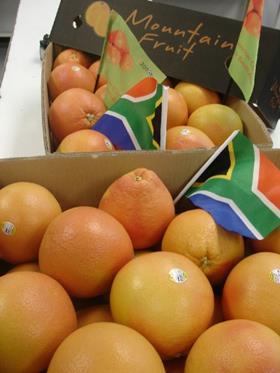
The first conventional reefer shipment of 2011 South African citrus season arrived in Philadelphia on the US eastern seaboard yesterday.
It is the first of 12 shipments scheduled for arrival in the US before late October.
The first Seatrade vessel, Cape Belle, carried a total of 66,000 cartons of clementines and 91,000 cartons of navels, along with some Midknight valencias and Star Ruby grapefruit.
Two container vessels carrying South African citrus to the port of Newark will arrive before the second conventional vessel of the season docks in Philadelphia in early July
The South African citrus shipments to the US are expected to be on the same level as last season, when around 40,000 pallets were shipped between May and October.
The South Africans start their new season against the background of increased competition from South American suppliers during the past two years.
Compliance with an extremely tough phytosanitary programme, a high cost structure and a negative exchange rate also make these testing times for South African growers and exporters.
Apart form the conventional reefer shipments, container vessels will carry organic Star Ruby grapefruit from the Orange River region, which will be part of the US export programme for the second year.
“We prefer containers because it is the best way we can ensure the integrity of our organic business,” says Santa Spangenberg of Orix Exports, a table grape and citrus producer in the area.
The volume of Star Ruby grapefruit will double this year compared to last year, but still only makes up a small fraction of total South African sendings to the US.
“We know we will have to slowly build this market,” says Santa Spangenberg. “We have a very good product, with sweet fruit, but it is different to what the US consumers are used to.
Significant plantings of Star Ruby grapefruit have taken place in the Orange River during the past few years and it is expect that exports of the category will increase in the years ahead.
Suhanra Conradie, CEO of the Western Cape Citrus Producers Forum, says South African growers continue to meet the increasing demand for South African citrus products while adhering to the strict governmental guidelines for quality and safety.
“Unlike fruit from other countries, fruit from South Africa remains fresher and has a longer shelf life in stores and in consumers’ homes because it is neither chemically treated nor fumigated on arrival in the US. Fruit from South Africa undergoes rigorous inspection by the USDA prior to leaving South Africa and again when it arrives in Philadelphia.”



